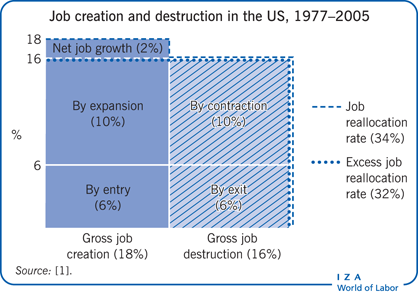Elevator pitch
Economic growth requires factor reallocation across firms and continuous replacement of technologies. Labor market institutions influence economic dynamism by their impact on the supply of a key factor, skilled workers to new and expanding firms, and the shedding of workers from declining and failing firms. Growth-favoring labor market institutions include portable pension plans and other job tenure rights, health insurance untied to the current employer, individualized wage-setting, and public income insurance systems that encourage mobility and risk-taking.

Key findings
Pros
Continuous transformation and massive job churning are pervasive traits of modern market economies.
High-growth firms are instrumental to economic growth and net job creation.
Labor markets should be organized to promote (potential) high-growth firms, especially through decentralized and individualized wage-setting and portable job tenure rights.
Public policy can facilitate restructuring by implementing insurance systems that encourage mobility and risk-taking.
Cons
Deregulation of labor markets also has a dark side: it creates insecurity and may lower commitment to employers, which can harm efficiency.
Deregulation of temporary contracts and staffing agencies cannot substitute for excessive regulation of permanent contracts.
Labor markets cannot be deregulated in isolation. Appropriate tax policy and competition policy measures are also called for.